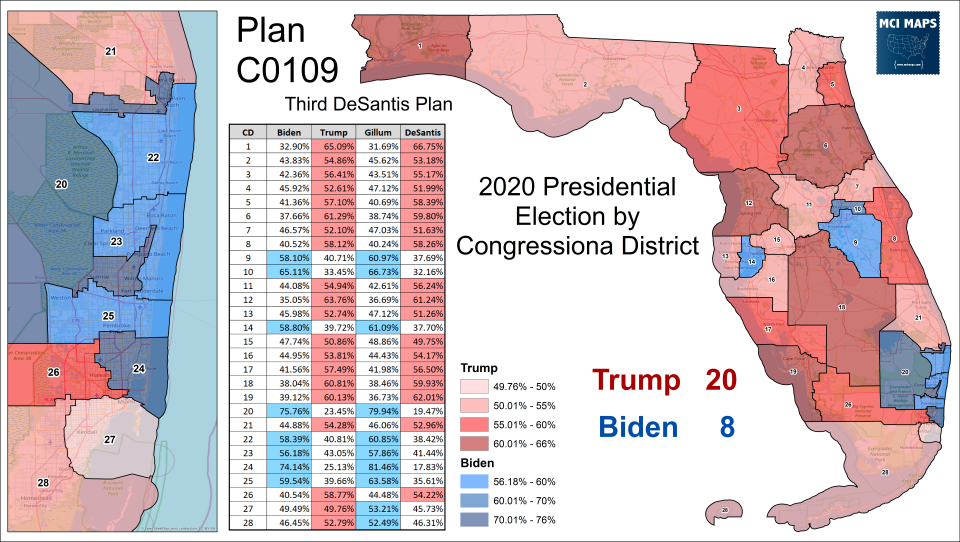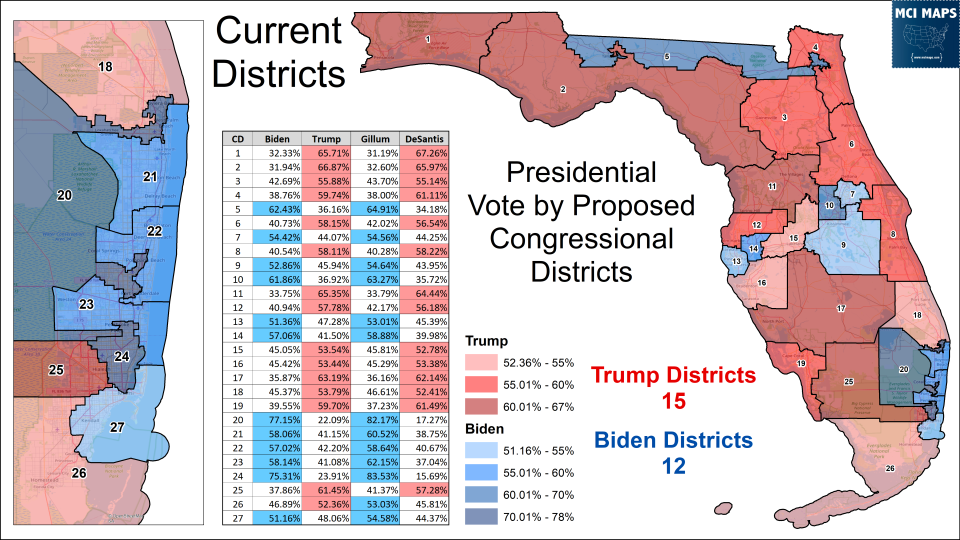Senate bows to DeSantis with map boosting GOP at expense of Black Democrats
- Oops!Something went wrong.Please try again later.
TALLAHASSEE – The state Senate bowed to Gov. Ron DeSantis’ demand and approved Wednesday a congressional redistricting map that could boost Republican seats in Congress from Florida, while cutting in half those held by Black Democrats.
The plan was advanced 24-15 in a party-line vote after Democrats repeatedly attacked the new boundaries as hyperpartisan and hurtful to Black voters.
“When you begin to trample on marginalized people ... that’s when you have to do some self-reflection and see if what you’re doing is right,” said Sen. Shevrin Jones, D-West Park, who added that DeSantis had usurped the role of mapmaking that the state constitution tasks to the Legislature.

But Sen. Kelli Stargel, R-Lakeland, dismissed the Democrats’ condemnation.
While the map could turn 20 of the state’s 28 congressional districts Republican — and cuts from four to two the number of seats likely to elect a Black candidate — Stargel insisted that election results are tied more to the quality of the candidate than demographics.
“To say this maps as it is drawn today is hurting minorities is not accurate,” Stargel said.
While the Senate was approving the map, the House began its debate on the proposal. Lawmakers are expected to complete the special session Thursday and send the map to DeSantis for his signature, unlike in March when a congressional plan approved by the Legislature was vetoed by the governor.
That plan had maintained boundaries that would have made it likely that four Black Democrats could be elected.

Governor looks to change map, and history: Special session: Florida lawmakers heeding Gov. DeSantis' demand for new congressional map, enraging opponents
Court fight likely: Ron DeSantis eyes court fight over Florida congressional map to reduce minority seats
GOP Legislature had defied DeSantis: Legislature defies DeSantis on redistricting, testing his veto threat
Sen. Darryl Rouson, D-St. Petersburg, on Wednesday told senators, “I don’t believe the governor is a racist,” citing his appointment of several agency heads in his administration.
“But…it’s fair to talk about the impact of policy…on a people, on citizens,” Rouson said, pointing out that the map before lawmakers is certain to be challenged in court because of its effect on Black voters.
Legal challenges certain
Rouson and other Democrats say the DeSantis-crafted plan is an unconstitutional violation of both the federal Voting Rights Act and the state’s Fair Districts constitutional standards that prohibit line-drawing that for minority voters, “diminish their ability to elect representatives of their choice.”
In the governor’s redistricting proposal, U.S. Rep. Al Lawson’s Black plurality, Tallahassee-to-Jacksonville district, would be shifted to a Duval County-only seat that strongly backed former President Donald Trump in the last election.
DeSantis has declared Lawson’s current, eight-county district as unconstitutional because it is racially gerrymandered, shaped largely to include a large Black population.
U.S. Rep. Val Demings, D-Orlando, who is leaving the House to challenge Republican U.S. Sen. Marco Rubio this fall, would see her current Central Florida District 10 lose a large portion of its Black voting age population in the DeSantis-backed map, a move seen as making it less likely to elect a Black candidate.
DeSantis is relying on a 2017 U.S. Supreme Court ruling in a North Carolina case that found it unconstitutional to racially gerrymander a seat, except in narrow instances, which Lawson’s Jacksonville-to-Tallahassee district may not meet.
That North Carolina ruling came two years after Lawson’s Congressional District 5 was created by the Florida Supreme Court, which had taken over the map-making in the last round of once-every-decade redistricting because of constitutional violations by Republican lawmakers who drew the state’s initial maps.
DeSantis concludes that the state’s, voter-approved Fair Districts minority standards are in conflict with federal rulings on redistricting and the U.S. Constitution’s equal protection clause.
DeSantis helps GOP in Congress
DeSantis’ approach — which could boost Republican seats from Florida — would help national GOP efforts aimed at regaining control of Congress in this fall’s midterm elections, when the governor also will be on the ballot, seeking re-election.
Republicans currently hold 16 seats in Florida’s 27-member congressional delegation, with the state adding a seat this year because of population gains in the 2020 Census.
Once-a-decade redistricting is a pivotal part of the battle for Congress this year, with only Florida, Missouri and New Hampshire not yet approving new maps. With its 28 seats, the outcome in Florida will prove significant for both Democrats and Republicans.
The focus on Florida also intensified after Democrats managed to increase their expected numbers in New York, Oregon and Illinois, while Republicans appear to have bolstered their chance for adding seats from Texas and Georgia.
While a court fight is certain to emerge from the map expected to gain final approval Thursday in the state House, lawmakers also worked to direct how legal challenges will be heard.
Republican lawmakers attached to the proposed map a provision requiring that any lawsuit that addresses state issues be heard only in state court, prohibiting a federal court from getting involved.
While federal courts could hear challenges based on federal matters, Democrats argued that the state restriction was designed to reduce the odds that any state issue goes before Tallahassee-area U.S. District Judge Mark Walker, who recently wrote a blistering 288-page ruling striking down new voting restrictions he found were racially discriminatory after being approved last year by Florida lawmakers.
The proposed map also includes $1 million in taxpayer money set aside for the state to defend itself against legal challenges. During redistricting battles spawned by the Legislature’s last attempt in 2012, lawmakers spent $11 million in legal expenses only to have congressional and state Senate redistricting plans taken over and drawn by the state Supreme Court.
John Kennedy is a reporter in the USA TODAY Network’s Florida Capital Bureau. He can be reached at jkennedy2@gannett.com, or on Twitter at @JKennedyReport
This article originally appeared on Tallahassee Democrat: DeSantis' congressional redistricting map gets Senate approval

